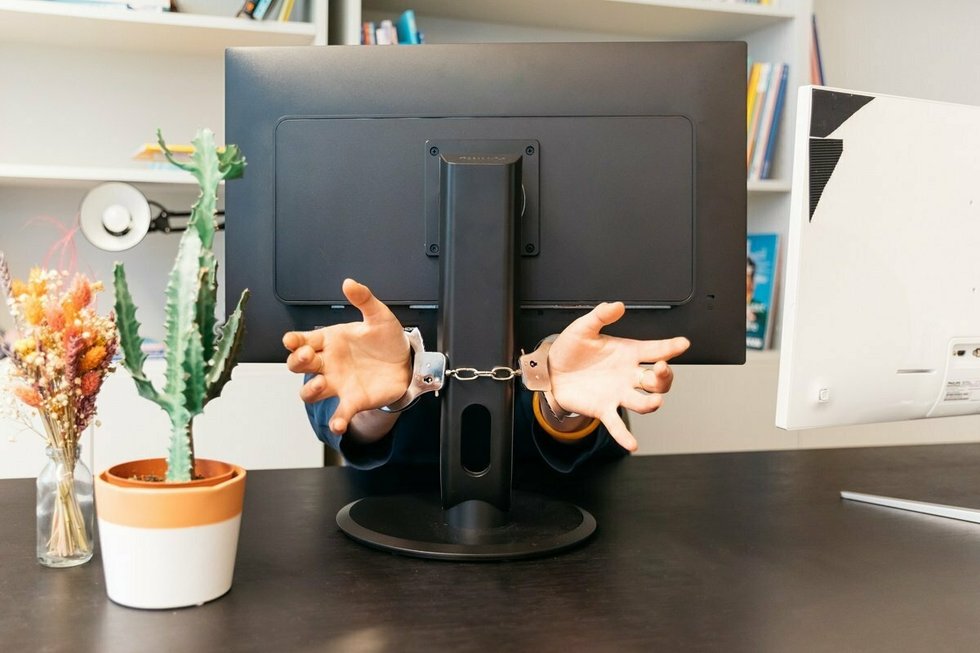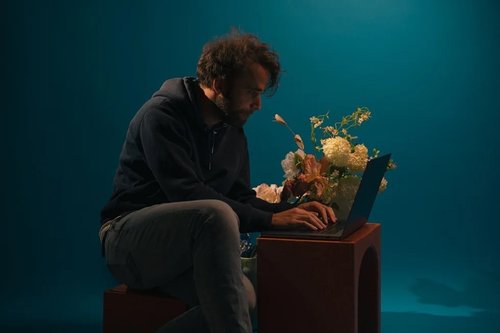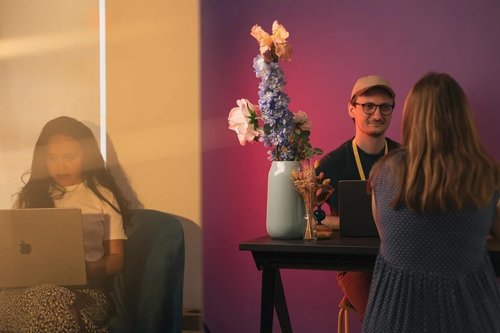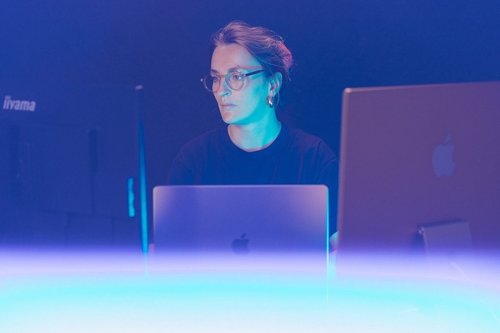The rule of computers: how devices hijacked our professional lives
Jul 21, 2021
8 mins


Journalist
Have you become so attached to the many devices that you take a break from working on your laptop by looking at social media on your phone? Do you struggle to focus on one project at a time? The very practice of switching tasks may be affecting your ability to take a project to completion. If this is your new normal, you are not alone.
Most of our professional lives would be impossible without our laptops, desktops, and even mobile phones. Yet when it comes to relaxing after work, many of us simply switch screens. Our devices dominate our lives. We asked psychologist and author Doreen Dodgen-Magee about how our beloved devices are changing our minds and bodies––and what can be done about this. Dodgen-Magee researches how technology affects our brains, bodies, relationships, and sense of self. In Deviced! Balancing Life and Technology in a Digital World, she explores how society could break away from the bad habits that have been formed and become better at using technology. Her second book, Restart: Designing a Healthy Post-Pandemic Life, investigates how we can re-enter the world in person after being tethered to our tech during the health crisis.
Most of us cannot imagine our professional lives without computers. Why are we so reliant on technology?
Technology makes our lives so much more convenient and more comfortable. Our devices also offer us the opportunity to multitask, so we can be connected with others and with our work, and feel as though we are being efficient. But peer-reviewed research tells us that we’ve become very proficient at being distracted. It’s not so much that we’re good at getting things done, we’re just proficient at toggling back and forth, during which our brains don’t process information as deeply. Our retention, recall, and performance is less robust when we are tending to many tasks at once.
Multitasking, or task switching, actually leaves us psychologically and physiologically dysregulated [ill at ease and emotionally activated] and overwhelmed. We just don’t realize it because we’re so used to it. We’ve come to recognize the sense of overwhelm and hyper-attentiveness that the digital landscape stimulates as our normal state. Then, when we step away from our devices at work and try to connect interpersonally or to do deep work, we feel anxious because we are disconnected from this thing that’s made our lives feel convenient.
We’ve all had tired eyes or an aching back after a long day of looking at a screen. Are there other physical side effects that we might not be aware of?
Yes, there are effects on the brain. The brain works on the principle of using it or losing it, and what we expose our brains to creates neural wiring. So if we expose our brains to a lot of task switching, our brains adapt and create a lot of wiring in the regions of the brain related to distraction and holding attention loosely. If we over-wire regions of the brain related to quick shifting of attention, then we prune off regions of the brain related to focus and depth of critical thinking. If we don’t expose our brains to opportunities to do those things, we lose the capability to do them.
That’s why we have come to feel like multitasking and task switching are so rewarding because we have under-exposed ourselves to experiences that would allow us to feel pleasure in things like deep work and doing one thing to completion before switching to the next.
The research on multitasking at work says the more we use computers, the better we become at task switching but there’s no research that says that task switching makes us feel more content or makes us better producers. It’s a little bit like saying, I smoke a lot so I’m a really good smoker.
It’s not so much that we’re good at getting things done, we’re just proficient at toggling back and forth, during which our brains don’t process information as deeply.
During the pandemic a lot of our interactions with colleagues have moved online. What impact is that having on our social skills and relationships?
I recognize that for people who are living with neurological, atypical realities or with social anxiety, technology provides profound opportunities. But, generally, if we aren’t discerning with technology, we don’t get the real benefits of using it. For instance, many people feel like social media is their only way of connecting, but social media use is not only correlated with anxiety and depression, it can cause anxiety and depression. So, people who think they’re getting their relational needs met through social media are probably just getting a surface-level feeling of being connected––and the every thing that they think is helping them could be hurting them.
Do you think it’s possible to have an online workspace that is as empathetic and human as it could be in real life?
If everybody involved is really rooted in an anti-narcissism, equity-based, and transparency-based reality, then there is a chance of doing that. You can build that culture by tending to things like helping your workforce to feel comfortable in the spaces where they are being asked to do things.
For example, for many people, their homes are not places where they would like to broadcast to others in Zoom meetings. Doing very basic things like providing a green screen that attaches to the back of a chair helps people to feel like they have a little bit of control.
Those who are moderating meeting spaces should also be aware that it’s much harder for people who deal with social anxiety or who live with a greater state of introversion to grab the microphone on a video conference call than in a physical room. Organizations should find ways to educate teams about stepping up or stepping back in meetings, and make sure that employees allow themselves to do some of both.
A technique I have found to be very meaningful in video spaces is “ouch and oops”. If somebody says something in a meeting that crosses a line or makes somebody feel uncomfortable, anyone can put “ouch” in the chat to indicate that, and the person who has made the statement can say “oops,” meaning let me try that again without creating a big uncomfortable moment.
We have under-exposed ourselves to experiences that would allow us to feel pleasure in things like deep work and doing one thing to completion before switching to the next.
But how can someone who has to use technology all day for work set boundaries?
Research from the world of yoga and integrated health shows that 10 minutes a day of mindfulness meditation––and this includes things like contemplative prayer or rhythmic exercise––bumps our neurological wiring into the prefrontal cortex, which is where you find the centers of emotional regulation, attuned communication and a greater feeling of personal agency.
There’s also research to back the idea that doing nothing for 10 minutes a day can have the same impact. Any person can commit to three sessions a day of three minutes of nothingness, and use that time to step toward a window and practice noticing the trees moving, or do some deep breathing. I suggest that people have things around their workspaces that stimulate senses other than their visual and auditory senses, such as essential oils, a fragrant candle, a stress ball, or a handheld manipulative game. Anything that pushes us away from visual and auditory stimulation, gets us back into our bodies, and lets us experience a sense of not hyper-tasking can have a profound effect.
Are there any benefits to using technology as much as so many of us do?
Most of us could stand to dial back the time we spend with our devices, but I believe if we use them moderately and use the right kinds, there are benefits. Some forms of technology are difficult on our systems, if not very harmful, such as super-fast-paced, overstimulating content such as first-person shooter games. These tax your brain, body, and sense of groundedness much more than watching a slow-paced documentary. Similarly, sending out 15 texts is probably going to create less deep relationships than sending one in-depth email or doing one video call.
It’s about questioning whether you have a balanced diet with your tech. Are you using technologies that connect you to others in real-time in authentic ways? Or are you only connecting to others on social media or places like Slack channels, where there’s pressure to perform? We need to think about the quality of the technology, the way in which it stimulates us, and having a healthy balance.
It can also be a good idea to force ourselves to wrestle creatively with a question or a work-related problem before we Google the answer. Creativity is actually positively correlated with boredom and we get more robust and nuanced responses when we spend some time thinking creatively. So if we make ourselves sit for a few minutes and think through something, we are much more likely to come up with a novel, creative, and sparkly response, than if we just find data.
People who think they’re getting their relational needs met through social media are probably just getting a surface-level feeling of being connected––and the very thing that they think is helping them could actually be hurting them.
How can we stay resilient when new technologies come along and take over our lives as did Zoom during the pandemic?
Think about the habit and think about the costs related to the habit. As organizations, we can think about what our real values are. For example, if your values are productivity and high quality then, does every Zoom meeting meet those goals in the way you want? It’s keeping an eye on the idea that these new things are exciting and convenient, but typically, convenience is not associated with excellence. So it’s about looking for ways to continue to engage with new technologies but also to make sure we are forcing ourselves some of the time to be innovative, to be uncomfortable, to get into spaces where we can experience new things to find out if those are even richer.
One of the best ways to do this is set goals. So for every three video calls, try one audio call. Or for every five interactions in a Slack channel, try one group email that’s a little deeper.
Looking to the future of work, teleworking has been hailed as a solution, but it relies on technology. Do we have to choose between working remotely and having boundaries with technology?
I hope that employers will respect employees’ needs to set boundaries around technology. During the pandemic, no one had a social life. So there was this unconscious feeling that if people did set boundaries, others in their workplace would not. There was an expectation that people would respond at all times. It would be inhumane for employers not to begin to be aware that we need to tend to a work-life balance with tech.
It’s not that we need to demonize technology, we just need to recognize our humanity. When we are working from home, it’s easy to take a break from work and then toggle over to our video game or our social media, rather than some of the things that traditional workspaces did to create rituals and physical activity. Going into the office marked the beginning of the day, leaving the office marked the end of the day, and we had the physical act of getting up from our desks and going outside or to the coffee machine. When we move work to the home, we’re less likely to do that. So organizations should support anything we can do to encourage people to tend to rituals that also help their bodies.
This could mean offering benefits such as compensation for a gym membership, standing desks and, if possible, opportunities for people to gather . . . once a month.
If we make ourselves sit for a few minutes and think through something, we are much more likely to come up with a novel, creative and sparkly response, than if we just find data.
What would your ideal be for the future of work in terms of how we interact with technology?
One of the things we’ve found is that we can do almost everything online. I hope we don’t just assume that we should do everything online. I hope that businesses will continue to privilege some forms of in-person connection and that some resources tend to the fact that employees are physical people who live in bodies with physical and mental health needs.
Photo: Welcome to the Jungle
Follow Welcome to the Jungle on Facebook, LinkedIn, and Instagram, and subscribe to our newsletter to get our latest articles every day!

More inspiration: Work-life balance

Back to school: How to balance continuing education with work
Balancing work and school is manageable. Choose the right course, inform your boss and friends, build good habits and take breaks to avoid burnout.
Jul 31, 2024

Clash of cultures: Unpacking the RTO conundrum
RTO mandates are a troubling trend in the workplace. So, what do workers and employers really think of it?
Jul 23, 2024

The 4-day workweek: 50 things we couldn't do without it
What would you do with one extra off day per week?
Feb 19, 2024

Does working eight hours a day really make sense?
The eight-hour workday may seem like a staple of modern work, but is it really necessary?
Oct 11, 2023

How social media professionals cope in an always-on world
Social media use can lead to feelings of anxiety, depression, and loneliness. We asked social media managers how they deal with the internet
Oct 02, 2023
The newsletter that does the job
Want to keep up with the latest articles? Twice a week you can receive stories, jobs, and tips in your inbox.

Looking for your next job?
Over 200,000 people have found a job with Welcome to the Jungle.
Explore jobs